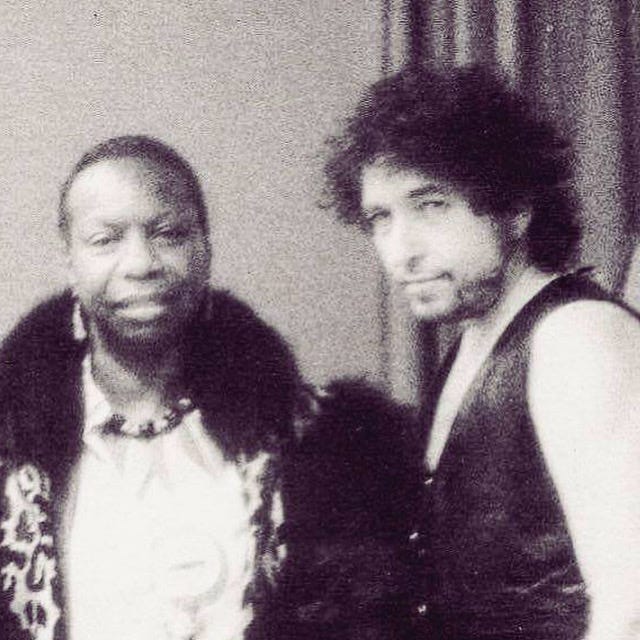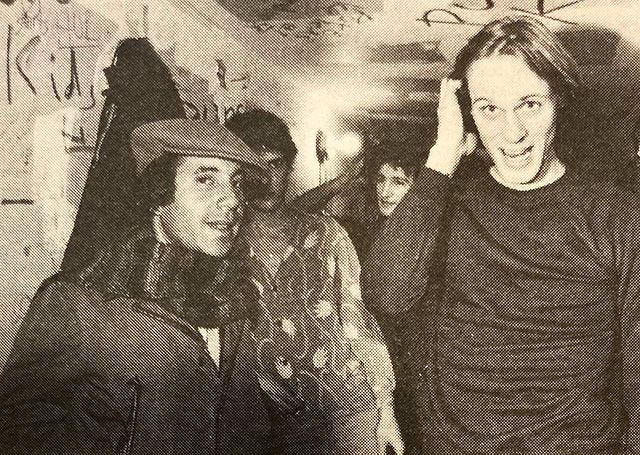Fluxblog #350: U2 • Talking Heads • David Byrne
Plus a playlist of Black artists performing Bob Dylan classics
This week’s playlist is BLACK INTERPRETATIONS OF BOB DYLAN 1963-1977, a collection of Dylan classics performed by his African American contemporaries, including Nina Simone, Jimi Hendrix, Stevie Wonder, Sam Cooke, Tina Turner, Richie Havens, The Staple Singers, and many more. This is something of a sequel to my very popular BLACK BEATLES playlist and I think both show an interesting cross-cultural exchange brought on as much by commercial considerations as a genuine respect for Dylan and The Beatles as songwriters. [Spotify | Apple | YouTube]
Also, as an FYI: Fluxcaviar, my continuously updated Spotify playlist for new music, has been rebooted for 2022 - jump in, keep up! It’s kinda impossible for me to mirror a playlist that’s constantly changing on other platforms, so my apologies to the Apple people.
The Day Is As Dark As The Night Is Long
U2 “Ultra Violet (Light My Way)”
Bono is a hopeless romantic, which serves him well when writing love songs and even better when he wants to tell his own story. “Ultra Violet” is a bit of both, an ode to his wife Ali that starts before there was a Bono or U2, when he was just a broke guy called Paul in a room with one dangling light bulb hanging over his bed. It’s an incredible image, so economical in evoking both squalor and distant hope that the band would recycle it as central visual iconography for the autobiographical narrative played out on their Innocence + Experience tours. In that context it’s a theatrical element that’s unabashedly sentimental but in “Ultra Violet” it’s a matter of setting the stakes – “when I was all messed up and I had opera in my head, your love was a light bulb hanging over my bed.” This is basically Bono’s way of saying she’s his day one, his ride or die.
But there’s more to “Ultra Violet” than simply saying this woman has been his guiding light since before he was anyone. The lines I’m quoting are from the climax of the song and the lyrics start off in a moment of severe crisis in the present before moving backwards in time to that foundation of pure love. The opening verse, which is sung nearly a cappella before The Edge’s guitar riff kicks in, is about as abject as Bono ever gets in his music. This is a distinctly non-suicidal type of guy in a “I don’t even want to be around anymore” moment. He admits that he cannot always be strong, which is totally fine. He then tells her that he needs her to be strong, which is hypocritical but emotionally honest in a song that’s essentially about depending on someone in your lowest moments.
There are other tensions in the song, matters of secrets and lies and whisper and moans, the sort of things that bring “silence to a house where no one can sleep.” He’s setting dramatic stakes but also acknowledging the complications and clashes and detentes of long-running adult relationships. Bono was very good at this in his prime, grounding his most earnest yearnings in the grime and grit of a real life.
The Edge’s guitar in “Ultra Violet” sounds as though he’s trying to play a Motown-ish funk rhythm but somehow getting closer to the sound of church bells. Everything that should signal something earthy and groovy gets shifted into more spiritual and orchestral sort of drama – Larry Mullen Jr’s drums pound like timpani, Adam Clayton’s bass drones more like a cello. They arrive at a similar aesthetic on “Until the End of the World,” this music that’s technically quite jaunty but conveys none of the mood you’d typically associate with that word. But you hear this music, this piece that conveys an odd holiness and bright ambiance, and it’s not hard to get how Bono got to where he did lyrically from that starting point.
Buy it from Amazon.
The Building That I Want To Live In
Talking Heads “Don’t Worry About the Government”
My listening habits naturally cycle familiar catalogs in and out of rotation, and in some cases I can go a very long time before coming back around to particular artists. A lot of what brings me back to an artist is based on whim or chance, I think in the case of David Byrne and Talking Heads just recently it was sparked by Byrne drastically changing the setlist of his Broadway show and including a few songs from Look Into the Eyeball, which is basically tied with Remain In Light as my favorite record in his body of work. (I know this is an uncommon take.)
I’ve spent a lot of the past few weeks moving to a new apartment, to the point that I found myself walking around the other day trying to get my head into ideas for writing but finding I didn’t really have many active emotions to engage with. I’d been so focused on tasks that I wasn’t really feeling much, or at least not much that would connect to art. And then in a moment of perfect coincidence I heard “Don’t Worry About the Government,” a song that expressed my actual thoughts: “my building has every convenience, it’s gonna make life easy for me, it’s gonna be easy to get things done.”
There’s often a tension in David Byrne’s lyrics between a guileless banality and the insinuation of ironic distance. If you want to hear “Don’t Worry About the Government” as snidely judgmental of a conformist character who does not question his lifestyle it would make a lot of sense, but I think the song works because what he’s saying about the routines of working and living in the world are things most people actually relate to. The character isn’t judging this, everything just is. He feels lucky and blessed to live in a good building, he acknowledges tensions in the world but focuses on the elements of infrastructure that work, and the civil servants who do their jobs well. The music feels like a pleasant equilibrium, the sentiment is all benign neutrality. It’s tremendously effective as a compelling piece of music that approaches feelings and ideas most would consider too dull for music.
Buy it from Amazon.
Talking Heads “Stay Up Late”
Byrne has spent a lot of his career essentially figuring out how to make unlikely sentiments and ideas work in music, and in subverting the tropes of popular music. In “Stay Up Late,” an up tempo tune from Little Creatures in 1985, seems to start from the premise of approaching the ubiquity of the word “baby” in pop music and taking it very literally. From a bit of distance “Stay Up Late” sounds like it’s about the usual stuff of pop music – flirtation, partying, sex – but the lyrics are actually about a kid who is excited to have a new baby sibling and thinks of him as a “plaything.” The idea of keeping the baby up all night is a weirdly transgressive thought, it’s a child’s notion of hedonism. Byrne embraces the innocence of the character while suggesting the parallels to adult behavior, a fundamental urge for fun that’s shaped by the context of childhood in the 20th century.
Buy it from Amazon.
David Byrne “Everyone’s In Love With You”
“Everyone’s In Love With You” has a very rom-com tone but approaches a romantic relationship from an unexpected angle: it’s a song about a guy who has noticed that since he’s been with this person, everyone he knows is also totally smitten with her too. His emotional response is interesting – he’s jealous, he’s proud, he feels a bit left out, he feels like the lesser half of the couple. (“I’m introduced to so-and-so but you’re the one they want to know.”) It’s a very sweet song, one that expresses a deep admiration for this person and the humility of understanding that he’s just got to share her with the world rather than keeping her his “big secret.”
Buy it from Amazon.
I wrote about the finale of Jonathan Hickman’s big X-Men story over at my House of X site. I loved it and though I wish he could have stayed on longer, I think he’s set up his successors Kieron Gillen, Al Ewing, Gerry Duggan, and Benjamin Percy to thrive in the coming years.








